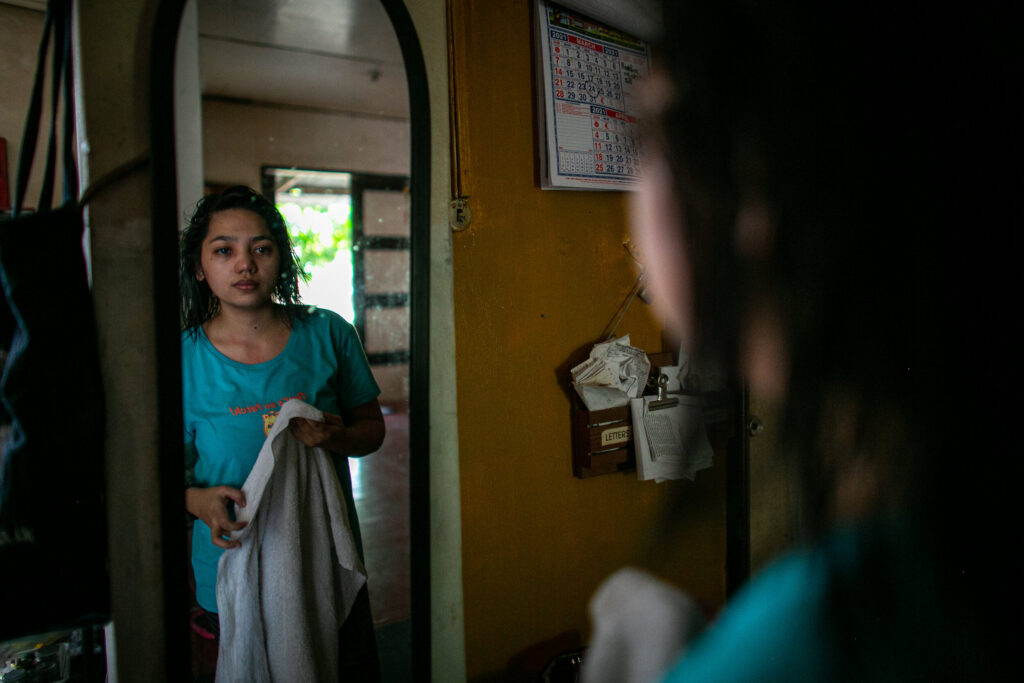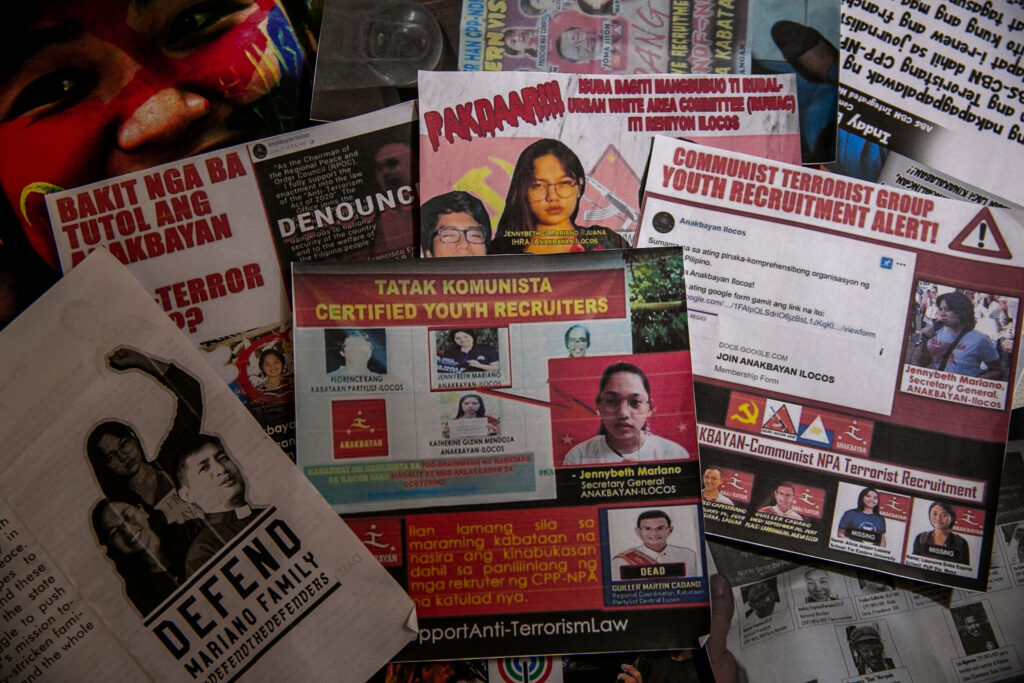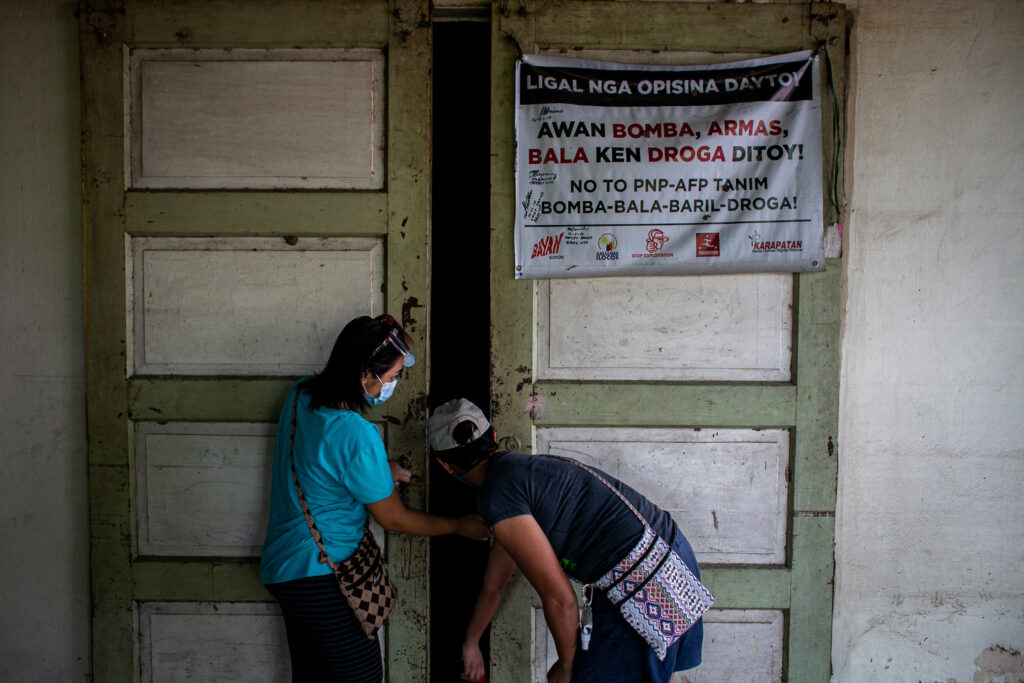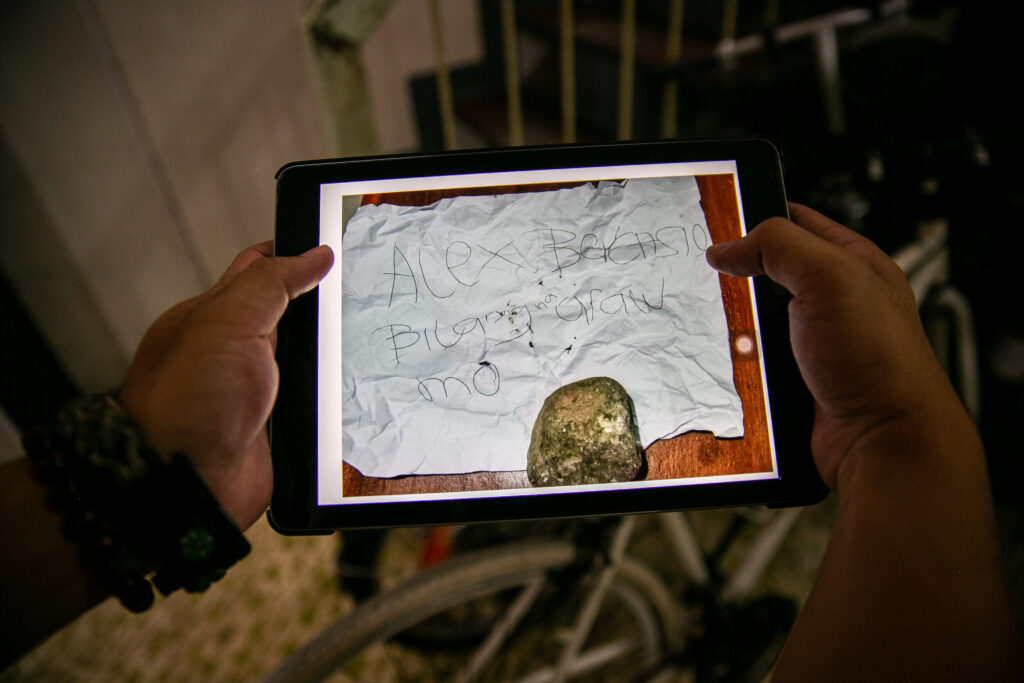It would be difficult to forcibly open the main door because of the large bolt lock. She’s more concerned about the back door that leads to the dense, dusky backyard.
Jenny Beth Mariano thought of installing additional bolt locks to fortify it but it would be useless because the door jam is already weak, old, and flimsy.
One strong blow could tear it all down.
The problem with the back door gave her too much anxiety especially after they were told to tighten security measures inside and outside the staff house.
It has been weeks since the alarm was raised after seven activists, including a church worker, were killed in a police dawn raid in Rizal province on March 7.
“We could be the next target, and if that happens, at least I want to give them a hard time opening the door. It’ll buy me time to put on clothes,” said Jenny.
She worries that if the state forces decide to barge in at the crack of dawn, she’ll be in her pajamas and braless.
“We know how the police and military operate. They will strip you of your dignity before putting a bullet in your head but I won’t allow them to do that to me,” she said.
Jenny’s spirited and fearless stance, however, cannot hide the manifestations that she is in a constant state of fear because of the state-sanctioned vilification and red-tagging.
She has been enduring sleepless nights and restless days. She had to cut her long hair, wear contact lenses, and dress differently from her usual outfit to steer clear of surveillance.
For the past two years, she’s been forced to move from one place to another seeking temporary sanctuary in Christian communities and church institutions.
The country’s National Task Force to End Local Communist Armed Conflict (NTF-ELCAC) has accused her of being a “youth recruiter” for the communist-led New People’s Army (NPA) in the Ilocos region.
She said the attacks against her intensified in 2020 when the NTF-ELCAC began mentioning her name in forums and anti-insurgency campaigns in different villages and towns in the region.
Memes and posters with her photograph and name linking her to the Communist Party of the Philippines (CCP) have circulated on various social media platforms.
Jenny denied the allegations that she has links to the communist rebels. “I am not a member of any armed group or any underground organization.”
Of all the accusations against her, “one thing is true,” she said. She organizes and mobilizes young people “but not for any other organization and not to become a rebel.”
Jenny is the president of the Christian Youth Fellowship (CYF) of the North Luzon-Amburayan Conference of the United Church of Christ in the Philippines (UCCP).
The 25-year-old church youth leader spearheads the CYF in ministries such as ecumenism and inter-religious dialogue, campaign for justice and peace, and mission for the poor.
She is also the current spokesperson of the Ilocos Human Rights Alliance (IHRA).
In 2017, she served as the secretary-general of ANAKBAYAN in Ilocos, an activist youth organization, which was tagged by the NTF-ELCAC as an above-ground organization of the CPP.
She said her active involvement in the human rights movement and church ministries for the poor has made her a target of red-tagging and government-sanctioned attacks.
During a virtual presser of the regional anti-insurgency task force in Ilocos on March 29, Army Brigadier General Audrey Pasia named Jenny as the “remaining recruiter” of communists in the Ilocos Sur province.
Pasia warned the public that the “primary adversary” of the Filipino youth is not the coronavirus disease but the “communist virus.”
“I am now overwhelmed with fear… Not just for myself but for my entire family’s safety. My parents are also victims of vilification and red-tagging because of the government’s allegations that our church and organizations we are in are supporters of the CPP-NPA,” said Jenny.
Her parents – UCCP Pastor Marcelino Mariano and Diaconal Minister Daisy Mariano – are also named as members of the communist rebels and have been receiving threats from alleged military agents.
The military accused Marcelino of preaching subversive ideologies for advocating environmental protection, land reform, and people-centered social services.
The 49-year-old pastor led the campaign against black sand mining in the region from 2010 to 2014.
Daisy, 48, is the deputy secretary-general of IHRA that monitors cases of human rights violations in the region.
Last year, church and rights groups launched the “Defend Mariano Family” campaign calling for an end to the series of attacks against the Marianos and other human rights activists.



“Exercise of religion is under attack”
The case of Jenny and her family “is not isolated.” Various religious institutions and church people across the country have been subjected to various state-sanctioned attacks.
On November 5, 2019, the Department of National Defense listed the National Council of Churches in the Philippines (NCCP) as one of the “front organizations of local communist terrorist groups.”
During a committee meeting at the House of Representatives, Major General Reuben Basiao, Armed Forces of the Philippines (AFP) Deputy Chief of Staff for Intelligence, presented a list of 18 organizations that provide funds to the communist rebels through “international solidarity work.”
In a document released by NTF-ELCAC on its social media account, it implicated NCCP, along with its member churches – the Iglesia Filipina Independiente (IFI) and the UCCP – as an “open sectoral organization” of the communist rebel group in the country.
The anti-communist agency claimed that these religious institutions have a direct link to the Christians for National Liberation (CNL), an underground movement and member organization of the National Democratic Front of the Philippines (NDFP).
Apart from the attacks on NCCP, various faith-based organizations and church workers have reported incidents of red-tagging, harassment, and intimidation.
In September 2018, an IFI priest in Mindanao reported a painted marking on their chapel saying, “IFI=NPA” (Iglesia Filipina Independiente = New People’s Army).
There were other markings found along the highway: “UCCP=NPA,” “RMP (Rural Missionaries of the Philippines) = NPA,” and “Bishop Ablon = NPA.”
Bishop Antonio Ablon is an IFI Mindanao prelate who has been subjected to various forms of intimidation and harassment after conducting a solidarity mission in an indigenous community in June 2018.
A few months after the incident, Bishop Ablon flew to Germany where he was given political asylum.

In June last year, the Facebook page of AFP’s Southern Luzon Command posted a poster implicating UCCP Pastor Irma Balaba as a former combatant of the NPA.
The post said that the pastor had surrendered to the government together with NDFP peace consultant Raffy Baylosis.
A few months before the incident, Pastor Balaba was red-tagged after supporting a humanitarian aid operation for typhoon victims in Cagayan Valley.
Red-tagging of church workers is “an explicit and dire threat,” according to NCCP secretary general Bishop Reuel Norman Marigza, who was also named as a communist supporter.
“Red-tagging is a prelude to the actual physical attack that intends to hurt or kill,” said the prelate.
In January 2019, Father Christopher Ablon, Bishop Ablon’s younger brother, had “a near-death experience” when they were followed by two unidentified men just outside the IFI National Cathedral in Manila.
CCTV footage revealed that the suspicious men were spying on the gates of the Cathedral for more than three hours already when Fr. Ablon and four other church workers went out.
“They followed us when we boarded a tricycle. I was sitting at the back of the driver. We stopped for a red traffic light at the corner of Taft Ave. and Padre Faura St. when one of my companions shouted, “He’s pulling out a gun. We will die here”,” said Fr. Ablon.
Fr. Ablon instructed his companion to immediately alight the vehicle. They crossed the main highway and went back to the Cathedral.
One week after the “Bloody Sunday massacre,” Redemptorist Father Alex Bercasio received a death threat.
An unidentified man threw a stone at the compound of a Redemptorist church in Laoag City. The stone was enveloped with a piece of paper with a writing that says, “Alex Bercasio Bilang na ang araw mo” or “Alex Bercasio, your days are numbered.”
The Catholic priest is an active advocate of indigenous peoples’ rights and has been leading some of the congregation’s social action programs in far-flung communities.
After the incident, Fr. Bercasio was forced to temporarily leave his post and seek sanctuary.



Rising cases of attacks
A report published by the rights group KARAPATAN revealed that there is a “rising number of cases of violations on civil and political rights” against activists and human rights defenders under the administration of President Rodrigo Duterte.
The report showed that from July 2016 to March 2021, there were a total of 114, 499 cases of state-sanctioned threat, harassment, and intimidation.
There were at least 394 individuals who have been killed and 493 cases of frustrated extrajudicial killings.
The group said at least seven church workers have been killed because of their involvement in human rights works, social justice, and environmental protection.
NCCP, however, recorded more than seven cases of political killings.
Wilmer Agorde, a member of the Promotion of Church People’s Response (PCPR) in North Cotabato, was stabbed and shot dead by an unknown assailant in front of his grandchildren, in February 2017.
Agorde had been at the forefront of campaigns on peasants’ ownership of unused agricultural land-reservation and against the encampment of soldiers in their community.
In September 2017, village council members Erning Aykid and Aylan Lantoy were shot dead in Oriental Mindoro by two unidentified assailants. Aykid was an IFI lay minister who worked with the indigenous Mangyan communities.
In November 2017, UCCP lay pastor Perfecto Hoyle was shot by two masked men in his front yard in Agusan del Norte. He was known as a staunch advocate of farmers’ rights.
Nephtali Morada was an active ecumenical leader in his younger years and a former chairperson of the Ecumenical Youth Movement. He was gunned down while on his way to work in June 2019 in Naga City.
Prior to his murder, fabricated charges were filed against him.
UCCP Pastor Rev. Ernesto “Tata” Estrella was shot dead in August 2019 by unidentified motorcycle-riding assailants while driving his motorcycle in North Cotabato.

Other church workers who were killed were Catholic priest Marcelito Paez of the Diocese of San Jose, Protestant Pastor Lovelito Quiñones, Gonzalo Rosales, and Salvador Romano.
In a report submitted to the United Nations Human Rights Council, the NCCP said most of the church people targeted “are those primarily fulfilling the Christian mandate and mission of ministering to the poor and the marginalized.”
“They undertake their prophetic task as Christians to be with the people, especially in times when the basic human rights of people and communities are being undermined,” it said.
The Council said the Christian mandate “compels [church workers] to be with the last of the least and with the poorest of the poor to defend God’s image in every human being.”
“Their faith compels them to accompany people in asserting and attaining their full rights, but they are vilified, harassed, and even killed for doing so,” it added.
On May 2, the national police arrested and detained UCCP Pastor Daniel Balucio in Sto. Domingo town, Albay province over alleged illegal possession of firearms and explosives.
Authorities reported that they have recovered from the pastor a Remington .45 caliber pistol, seven bullets, two M-14 rifle magazines, a hand grenade, and a communist flag.
In a statement, the UCCP Council of Bishops said the pastor was targeted by the government because of his mandate to “side and journey with the poor and the downtrodden.”
Pastor Balucio was supervising a humanitarian mission to aid typhoon victims at the time of his arrest.

In April, the Davao Regional Trial Court issued a warrant of arrest against the administrators of UCCP-HARAN Center, Davao del Norte for charges of child abuse.
Police officers came to the office of the UCCP Southern Mindanao District Conference and Brokenshire College on April 27 looking for the church leaders.
The names listed in the warrant were Bishop Hamuel Tequis of the UCCP Southeast Mindanao Jurisdiction Area, Rev. Daniel Palicte, Ephraim Malazarte, social workers Lindy Trenilla, Grace Avila, and Pasaka Confederation of Lumad Organization Secretary General Christony Jun Monzon.
They have been charged with violation of Republic Act 7610 or the Special Protection of Children Against Abuse, Exploitation and Discrimination Act.
UCCP’s HARAN, or “Home and Altar for Renewal, Action, and Nurture,” has been providing sanctuary to displaced indigenous people for more than eight years already.
Bishop Tequis said it is “disturbing that the government perceives religious ministries for the poor as a threat” against national security.
The prelate said UCCP-HARAN as a sanctuary for indigenous people displaced by armed conflict “has nothing to do with any ideological advance but merely a response to the cry of the displaced people for a safe refuge.”
NTF-ELCAC accused the church group of using the issue of the indigenous peoples to solicit foreign donations.
The task force also claimed that the HARAN center serves as a training ground for young indigenous people to become communist rebels.
In March, the Anti-Money Laundering Council issued a freeze order on the assets of UCCP-HARAN Center, which covered three bank accounts.

A report in the Philippine News Agency noted that the order stemmed from an investigation on allegations that the Protestant center’s assets have been “used to finance terrorism.”
It was not the first time that the government went after the assets and bank accounts of a religious institution.
In February 2020, several bank accounts of the Catholic church group Rural Missionaries of the Philippines (RMP) have been “frozen” on suspicions of “terrorism financing.”
RMP is a mission-partner of the Association of Major Religious Superiors in the Philippines and is known in rural areas for the services it provides to poor communities.
The church group said the order has prevented access to 11 bank accounts: two handled by the RMP central office, and nine managed by the RMP’s northern Mindanao chapter.
The money in the accounts is “for completed and ongoing projects of the RMP, as well as for its internal operations,” said the organization.
A civil forfeiture case has been filed against the RMP’s 15 bank accounts over allegations of “financing terrorist activities” in September 2020.
On September 23, the religious group learned that a civil forfeiture case has been filed at the Manila Regional Trial Court against 15 of its bank accounts.
The Promotion of Church People’s Response (PCPR) condemned the move against the organization that has been “at the forefront in pioneering humanitarian response and delivery of services.”
Father Rolly de Leon, co-chairperson of PCPR, said RMP “faces attacks precisely because they have been exposing state human rights violations in rural communities.”
The priest accused the administration of President Duterte of “restricting humanitarian aid and development ministries” in rural areas as part of the government’s anti-insurgency campaign.
“These latest efforts to freeze the accounts of church institutions lay bare a sinister intention to undermine its avowed ministries with the poor,” said Father De Leon.
“Democratic space and civil liberties have become more and more restricted, with pronouncements and machinations that seek to cast aspersions on church people delivering much-needed services in poor communities,” he added.

Last year, the Commission of Churches on International Affairs of the World Council of Churches (CCIA-WCC) appealed to the UN Human Rights Council and the Government of the Philippines to “put an end to human rights violations against church people.”
It also called for respect to the freedom of religion and the exercise of ministries in the furtherance of religious beliefs.
The Commission urged the Philippine government to rescind its counter-insurgency program, “which has resulted in many human rights violations.”
Red-tagging is a prelude to many other human rights violations. It puts a person or an entire community in a constant state of fear as it justifies extrajudicial killing.
It is an attack not only against a religious institution or a church worker but against the “Church of the Poor” that “signifies that the Church’s concern for the poor is not merely a choice it has to make but constitutes as an integral dimension of its very identity as a Church.”
The concept of the Church of the Poor is what keeps Jenny and other red-tagged church leaders continuing the mission amidst the attacks and threat to life.